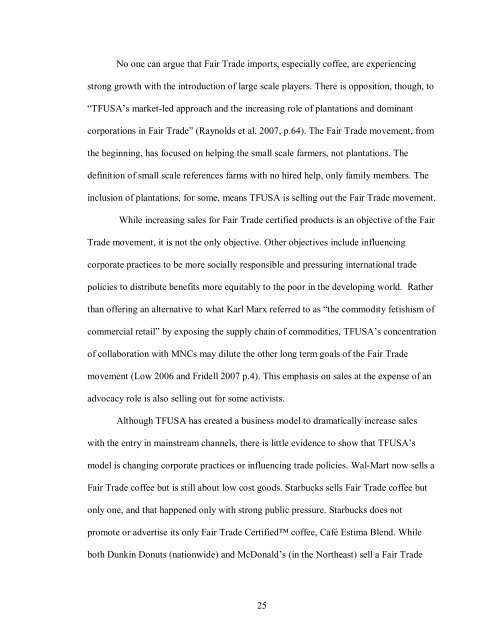The Challenges of Marketing Fair Trade - Wynne, Sandy
The Challenges of Marketing Fair Trade - Wynne, Sandy
The Challenges of Marketing Fair Trade - Wynne, Sandy
Create successful ePaper yourself
Turn your PDF publications into a flip-book with our unique Google optimized e-Paper software.
No one can argue that <strong>Fair</strong> <strong>Trade</strong> imports, especially c<strong>of</strong>fee, are experiencing<br />
strong growth with the introduction <strong>of</strong> large scale players. <strong>The</strong>re is opposition, though, to<br />
“TFUSA’s market-led approach and the increasing role <strong>of</strong> plantations and dominant<br />
corporations in <strong>Fair</strong> <strong>Trade</strong>” (Raynolds et al. 2007, p.64). <strong>The</strong> <strong>Fair</strong> <strong>Trade</strong> movement, from<br />
the beginning, has focused on helping the small scale farmers, not plantations. <strong>The</strong><br />
definition <strong>of</strong> small scale references farms with no hired help, only family members. <strong>The</strong><br />
inclusion <strong>of</strong> plantations, for some, means TFUSA is selling out the <strong>Fair</strong> <strong>Trade</strong> movement.<br />
While increasing sales for <strong>Fair</strong> <strong>Trade</strong> certified products is an objective <strong>of</strong> the <strong>Fair</strong><br />
<strong>Trade</strong> movement, it is not the only objective. Other objectives include influencing<br />
corporate practices to be more socially responsible and pressuring international trade<br />
policies to distribute benefits more equitably to the poor in the developing world. Rather<br />
than <strong>of</strong>fering an alternative to what Karl Marx referred to as “the commodity fetishism <strong>of</strong><br />
commercial retail” by exposing the supply chain <strong>of</strong> commodities, TFUSA’s concentration<br />
<strong>of</strong> collaboration with MNCs may dilute the other long term goals <strong>of</strong> the <strong>Fair</strong> <strong>Trade</strong><br />
movement (Low 2006 and Fridell 2007 p.4). This emphasis on sales at the expense <strong>of</strong> an<br />
advocacy role is also selling out for some activists.<br />
Although TFUSA has created a business model to dramatically increase sales<br />
with the entry in mainstream channels, there is little evidence to show that TFUSA’s<br />
model is changing corporate practices or influencing trade policies. Wal-Mart now sells a<br />
<strong>Fair</strong> <strong>Trade</strong> c<strong>of</strong>fee but is still about low cost goods. Starbucks sells <strong>Fair</strong> <strong>Trade</strong> c<strong>of</strong>fee but<br />
only one, and that happened only with strong public pressure. Starbucks does not<br />
promote or advertise its only <strong>Fair</strong> <strong>Trade</strong> Certified c<strong>of</strong>fee, Café Estima Blend. While<br />
both Dunkin Donuts (nationwide) and McDonald’s (in the Northeast) sell a <strong>Fair</strong> <strong>Trade</strong><br />
25


